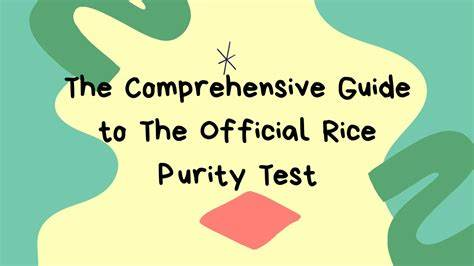The “rice purity test” has become a viral sensation, sparking intense debates and discussions across various platforms, particularly YouTube. This seemingly innocent challenge has evolved into a complex social phenomenon with far-reaching implications. In this comprehensive article, we will delve into the origins, mechanics, and controversies surrounding the rice purity test, examining its impact on individuals and society.

What is the Rice Purity Test?
The rice purity test is a self-assessment questionnaire that purports to measure an individual’s “purity” based on their sexual experiences. Participants typically start with a container of rice and remove grains corresponding to various sexual activities they have engaged in. The number of remaining grains is considered a measure of purity.
While the concept might appear harmless, the test has ignited fierce debates about sexuality, morality, judgment, and body shaming.
Origins and Spread
The exact origins of the rice purity test are unclear, but it is believed to have emerged from online communities and social media platforms. The test gained significant traction on YouTube, where countless videos showcase individuals taking the challenge and sharing their results. The visual nature of the test, coupled with its potential for shock value, contributed to its rapid spread.
Mechanics of the Test
The rice purity test typically includes a list of sexual activities, ranging from kissing to more explicit acts. Participants are instructed to remove a grain of rice for each activity they have experienced. The remaining rice supposedly represents their level of purity.
It’s important to note that the specific content of the test can vary widely, and the number of grains associated with each activity is subjective. Some versions of the test also include questions about relationships, substance use, and other personal behaviors.
Criticisms and Controversies
The rice purity test has faced substantial criticism for several reasons:
- Reinforcement of Purity Culture: Critics argue that the test perpetuates harmful notions of sexual purity and shame, particularly for women. It can contribute to body shaming and the stigmatization of individuals who have engaged in certain sexual behaviors.
- Oversimplification of Sexuality: The test reduces complex human sexuality to a numerical value, ignoring the diverse range of experiences, relationships, and consent issues.
- Lack of Scientific Validity: The test has no scientific basis and does not accurately measure any meaningful psychological or social construct.
Psychological Impact
Engaging in the rice purity test can have psychological consequences. Some individuals may experience feelings of shame, guilt, or inadequacy based on their results. Others may face pressure to conform to societal expectations of purity. It is essential to recognize that sexual experiences are a normal part of human development, and there is no one-size-fits-all definition of purity.
Social Implications
The rice purity test reflects broader societal attitudes towards sexuality, gender, and body image. It highlights the pressure individuals, particularly women, often face to adhere to narrow and restrictive sexual norms. The test can contribute to a culture of sexual shaming and judgment.
Alternatives to the Rice Purity Test
Instead of engaging in harmful and unproductive activities like the rice purity test, individuals can focus on developing healthy relationships, practicing safe sex, and fostering open communication about sexuality. Education and awareness about sexual health, consent, and body positivity are crucial for promoting a more inclusive and respectful society.
The rice purity test is a complex and controversial phenomenon with far-reaching implications. While it may appear as a harmless game, it reinforces harmful stereotypes, promotes body shaming, and oversimplifies human sexuality. It is essential to critically examine the messages conveyed by such tests and to prioritize education, empathy, and respect for all individuals.

FAQ’S
What is the Rice Purity Test?
The Rice Purity Test is a controversial questionnaire that has circulated online, primarily among young people. It involves a list of sexual activities, with participants crossing off items they have done. The number of remaining un-crossed items is considered a measure of “purity.”
Is the Rice Purity Test Accurate?
No, the Rice Purity Test is not an accurate measure of a person’s worth, morality, or character. It promotes harmful stereotypes about sexuality, virginity, and relationships.
What are the Negative Impacts of the Rice Purity Test?
The Rice Purity Test can lead to feelings of shame, guilt, and inadequacy. It can also reinforce unrealistic expectations about sex and relationships, and contribute to a culture of sexual shaming.
Is it Okay to Have Sex?
Yes, it is perfectly normal and healthy to engage in sexual activity when you are ready, consensual, and in a safe environment. Everyone’s sexual journey is different, and there is no right or wrong way to experience it.
Does the Rice Purity Test Promote Abstinence?
While the Rice Purity Test might seem to promote abstinence, it’s important to understand that abstinence is a personal choice and should be based on individual values and beliefs, not on external pressure or judgment.
What is Consent?
Consent is freely given, enthusiastic, and ongoing agreement to participate in a sexual activity. It cannot be coerced, pressured, or assumed. It’s essential to communicate openly and honestly with your partner about your boundaries and desires.
What are Healthy Relationships?
Healthy relationships are built on trust, respect, communication, and equality. Both partners should feel safe, valued, and supported. It’s important to prioritize your own well-being and to set boundaries.
Where Can I Get Help and Support?
If you are struggling with issues related to sexuality, relationships, or body image, there are many resources available to help. You can talk to a trusted friend, family member, counselor, or healthcare provider.
To read more, Click here